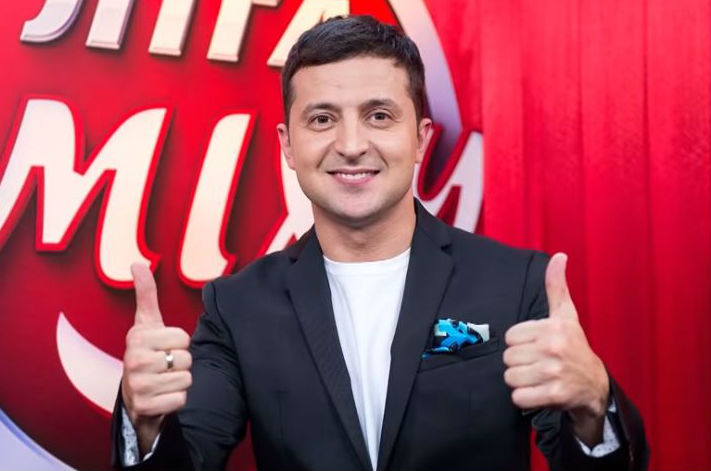
Most experts have reacted negatively to the announcement that Ukrainian comedian Volodymyr Zelenskiy will stand in the presidential election in spring 2019. Indeed, Zelenskiy’s candidacy is problematic for at least three reasons. Still, for all the skepticism, Zelenskiy’s participation in the race may also have a bright side.
First the problems. Zelenskiy has no political experience. He has not held any governmental or any other public sector office before. His main competitors, incumbent President Petro Poroshenko and former Prime Minister Yulia Tymoshenko, have held parliamentary seats, party chairpersonships, as well as executive posts. They are also well-connected internationally, while Zelenskiy seems to have had no noteworthy foreign affairs exposure.
In peaceful times and under stable conditions, a Zelenskiy presidency might be an experiment worth considering. Yet, as Ukraine’s geopolitical situation is extremely complicated, a Zelenskiy presidency would be a chancy development. His partially naïve statements on Ukraine’s international relations and announced recruitment of an explicitly non-political team indicate that there could be confusion at the beginning of his tenure. Ukraine and her various foreign challenges may not have time for such a transition period.
Second, skeptics contend that a Zelenskiy presidency may be no different from earlier oligarchic rule. Zelenskiy is right to emphasize his clean hands and non-involvement in the shadowy schemes of Ukraine’s post-Soviet clan rule. He has become legitimately rich as a popular television star and producer of successful entertainment programs. But there is suspicion about his links to Ihor Kolomoyskiy, a notorious oligarch and owner of the influential 1+1 TV channel that airs most of Zelenskiy’s programs. Zelenskiy brilliantly played the incorruptible and oligarch-slaying Ukrainian president Vasyl Holoborodko in the popular TV sitcom “Servant of the People.” But few believe that the real president Zelenskiy would be as effective at fighting corruption as the fictional Holoborodko.
Third, the political satirical aspects of Zelenskiy’s comedy work and his major TV show “Vechernyi kvartal” (Evening Block) have acquired a strange aftertaste after Zelenskiy got into the race. His “95-yy kvartal” (95th Block) team has made fun of various presidential candidates, including Poroshenko and Tymoshenko, numerous times. Now these still airing sketches have suddenly become parts of Zelenskiy’s electoral campaign.
Yet, there are also positive aspects of Zelenskiy’s entry into politics, and especially so, if it goes beyond his presidential bid. Until the last day of 2018, it looked as if the 2019 contest would be a repetition of older presidential competitions, pitting incumbent Poroshenko against veteran challenger Tymoshenko. Although Poroshenko and Tymoshenko have become sworn enemies over the last fifteen years, many perceive them as being of a similar generation, type, and quality. Zelenskiy’s participation is stirring up debate over visions for Ukraine’s future. His bid messes up old models of party competition, political technology, and oligarchic bickering.
Many suspect that Zelenskiy is merely a novel instrument of manipulation in the hands of behind-the-scenes patrons and especially of the infamous Kolomoyskiy. But even if that’s true, it will be not easy for Zelenskiy to repay his debts. Given his self-styled image as a corruption fighter, it would be political suicide for Zelenskiy if the public begins to perceive him as just another medium for infiltration of private interests into politics. This constraint may be even more important for his future faction in parliament.
To be sure, Zelenskiy and his entourage will be as much a target of seductive corruption schemes as other political parties and individual deputies. But as a supposedly novel anti-oligarchic group, Zelenskiy’s party will be especially vulnerable to any disclosures of bribe-taking, kick-backs, and nepotism. Chances are that Zelenskiy’s faction will thus become a relatively alien element in Ukraine’s corrupt parliament. Whatever shakes the old structures of post-Soviet political advancement, procedure, and decision-making is arguably good for Ukraine’s governance.
A second positive aspect of Zelenskiy are his roots in southeastern Ukraine, and his appeal to Russophone Ukrainians. Zelenskiy is less demonstratively pro-Western than Poroshenko and Tymoshenko, but he presents himself as a Ukrainian patriot, has taken a clear position in the Russian-Ukrainian conflict, apparently knows English well, and seems to be intuitively liberal. If Zelenskiy creates a real party that becomes popular, electable, and successful in southeastern Ukraine, he might be able to make a substantial contribution to Ukrainian nation-building.
A final positive aspect of Zelenskiy’s possible rise is his partly Jewish family background. While Ukrainians recognize Zelenskiy’s Jewish roots, this biographical fact has not become a topic of debate, much in the same way in which Prime Minister Volodymyr Groisman’s Jewish origins are rarely mentioned in Ukraine. Of course, this is as it should be.
Zelensky’s possible rise will help to correct the still widespread international misperception of Ukraine as a hotbed of xenophobia. Ukraine has various real problems related to its radical right-wing parties, official memory policies, and attacks on minorities. But these issues also exist in other European countries, and make Ukraine hardly special. Many incompetent Western commentators, nevertheless, continue to reproduce the Kremlin’s disinformation stereotype of Ukraine as being extraordinarily ultra-nationalistic. While this aspect of Zelenskiy’s political ascent may look irrelevant to many Ukrainians, it may be a real factor improving Ukraine’s image in the West.
In sum, while Zelenskiy is not a suitable president for Ukraine (yet), his forthcoming engagement in politics may not be all that bad.
Andreas Umland is a senior non-resident fellow at the Institute of International Relations in Prague, principal researcher with the Institute for Euro-Atlantic Cooperation in Kyiv, and general editor of the ibidem-Verlag book series “Soviet and Post-Soviet Politics and Society” distributed by Columbia University Press.
Image: Ukrainian comedian Volodymyr Zelenskiy is running for president. Courtesy screenshot В гостях у Гордона
